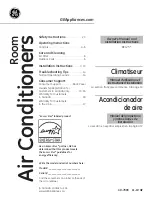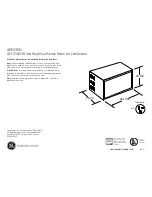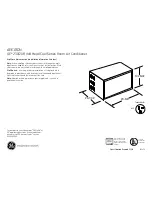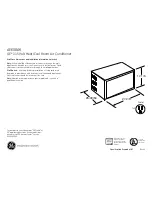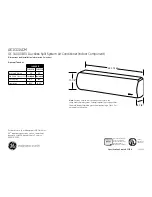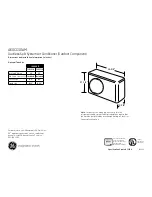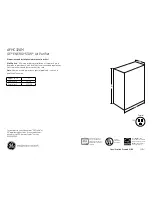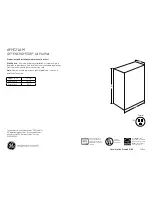
Refrigeration Service Procedures
133
Accumulator Replacement
Removal
1. Pump down the low side and equalize the
pressure to slightly positive. Make sure to
front seat the suction service valve to isolate
the low side and use the suction access port to
access the low side.
2. Unsolder the inlet and outlet refrigerant
suction lines from the accumulator tank. Make
sure to use a heat sink on the ETV.
3. Unsolder the refrigerant line coming from the
purge check valve.
4. Unbolt and remove the accumulator from the
unit.
Installation
1. Place the accumulator in the unit and tighten
the mounting bolts.
2. Reconnect (solder) the refrigerant line coming
from the purge check valve.
3. Solder the inlet and outlet suction lines to the
accumulator tank. Make sure to use a heat sink
on the ETV.
4. Pressurize the low side and check for leaks.
5. If no leaks are found, replace the liquid line
drier then evacuate the low side.
6. Open the refrigeration valves and place the
unit in operation. Check the refrigerant charge
and the compressor oil. Add as required.
Compressor Test
NOTE: The Scroll compressor can not be
pumped down below 10 in. Hg vacuum
(-34 kPa). Check the compressor efficiency
using the following procedure.
1. Install a gauge manifold set. Attach the low
pressure gauge to the service port on the
suction service valve. Attach the high pressure
gauge to the discharge service port. A low loss
fitting must be used on the hose connected to
the discharge service port.
2. Run the unit in high speed cool until the
system pressures stabilize.
3. Note the discharge pressure on the high
pressure gauge.
4. Cover the condenser and check the discharge
pressure. The compressor should be able to
increase the discharge pressure by at least 100
psig (689 kPa) or to 375 psig (2586 kPa). The
compressor is probably faulty if it cannot raise
the head pressure by 100 psig (689 kPa) or to
375 psig (2586 kPa).
Compressor Replacement
Removal
1. Recover the refrigerant charge.
2. Loosen and remove the electric motor
(jackshaft)/compressor belt from the
compressor pulley.
3. Unsolder the discharge line and the liquid
injection line from the compressor.
4. Unbolt the suction valve from the compressor.
5. Disconnect the compressor temperature sensor
wires.
6. Remove the compressor/frame bracket and the
compressor mounting bolts.
7. Lift the compressor out of the unit. Keep the
compressor ports covered to prevent dust, dirt,
etc., from falling into the compressor.
Installation
1. Lift the compressor into the unit and install
the mounting bolts and the compressor/frame
bracket.
NOTE: New compressors are shipped with a
full oil charge. Install the new compressor
with the full oil charge and check the oil
level after operating the unit for at least 30
minutes.
2. Install the suction service valve using new
gaskets soaked in refrigeration oil.
3. Reconnect the compressor temperature sensor
wires.
4. Reconnect (solder) the discharge line and the
liquid injection line.
Summary of Contents for T-1080S
Page 102: ...Engine Maintenance 101 Figure 182 Fuel and Oil System Components ...
Page 182: ...Index 181 Unit Options 23 W wiring 79 wiring diagrams index 182 ...
Page 184: ...183 Schematic Diagram Page 1 of 2 RELEASED 06 Jul 2015 13 52 47 GMT 7 ...
Page 185: ...184 Schematic Diagram Page 2 of 2 RELEASED 06 Jul 2015 13 52 47 GMT 7 ...
Page 186: ...185 Wiring Diagram Page 1 of 5 ...
Page 187: ...186 Wiring Diagram Page 2 of 5 RELEASED 06 Jul 2015 13 52 47 GMT ...
Page 188: ...187 Wiring Diagram Page 3 of 5 ...
Page 189: ...188 Wiring Diagram Page 4 of 5 RELEASED 06 Jul 2015 13 52 47 GMT ...
Page 190: ...189 Wiring Diagram Page 5 of 5 ...


































